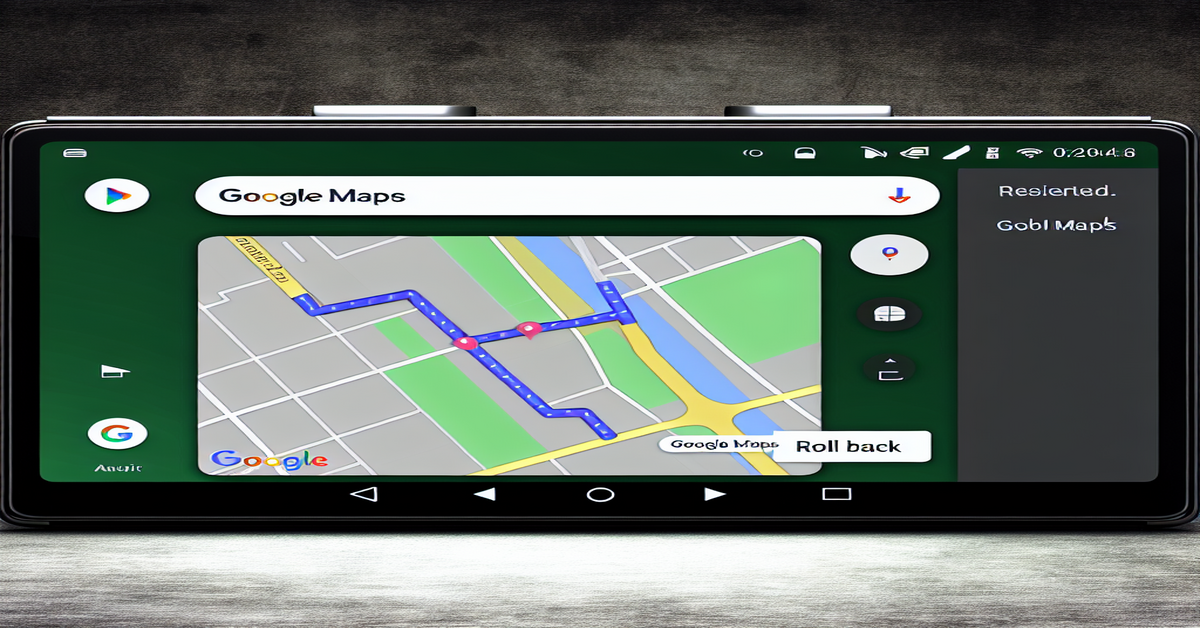Google Listens to User Feedback: Reverting Controversial Google Maps Update on Android Auto
In a world where technology is constantly evolving, it’s crucial for companies to listen to their users and adapt accordingly. Google, a tech giant known for its innovative products and services, recently demonstrated this principle by reversing a controversial update to Google Maps on Android Auto.
The update in question, which was rolled out recently, had altered the behavior of the map display on Android Auto. The change caused the map to center on the current location more frequently, which many users found to be annoying and less intuitive. The update was met with significant backlash from the Android Auto community, who voiced their concerns and dissatisfaction with the new feature.
User Feedback: The Driving Force Behind Change
One of the most critical aspects of any successful product is user feedback. Companies that actively listen to their users and take their opinions into account are more likely to create products that meet the needs and expectations of their target audience. In this case, Google took notice of the widespread criticism and decided to take action.
The decision to revert the update was not taken lightly. Google’s team of developers and product managers carefully reviewed the feedback they received from users and determined that the best course of action was to restore the previous behavior of Google Maps on Android Auto. This move demonstrates Google’s commitment to providing the best possible user experience and ensuring that their products meet the needs of their users.
The Importance of Intuitive Design
One of the key reasons behind the backlash against the Google Maps update was its lack of intuitive design. Intuitive design is a crucial aspect of any user interface, as it allows users to navigate and interact with the product easily and efficiently. When a product is not intuitive, it can lead to frustration and a poor user experience.
In the case of the Google Maps update on Android Auto, many users found the new centering behavior to be counterintuitive and disruptive to their navigation experience. By frequently centering the map on the current location, the update made it more difficult for users to see upcoming turns and plan their routes effectively.
Balancing Innovation and User Experience
While it’s essential for companies to innovate and introduce new features to their products, it’s equally important to strike a balance between innovation and user experience. Sometimes, what may seem like a good idea on paper may not translate well in practice, and it’s crucial for companies to be willing to admit when they’ve made a mistake and take steps to rectify it.
In this case, Google’s decision to revert the update shows that they are willing to prioritize user experience over their own vision for the product. By listening to user feedback and taking action to address their concerns, Google has demonstrated that they value their users and are committed to providing the best possible experience.
The Future of Google Maps on Android Auto
Looking ahead, it will be interesting to see how Google approaches future updates to Google Maps on Android Auto. While the company will undoubtedly continue to innovate and introduce new features, it’s clear that they will need to be more mindful of user feedback and ensure that any changes they make are intuitive and enhance the overall user experience.
One potential area for improvement could be in the way that Google communicates updates to its users. By providing clear and concise information about upcoming changes and giving users the opportunity to provide feedback before an update is rolled out, Google could potentially avoid situations like this in the future.
Conclusion
In conclusion, Google’s decision to revert the recent update to Google Maps on Android Auto is a testament to the importance of user feedback and intuitive design. By listening to their users and taking action to address their concerns, Google has demonstrated that they are committed to providing the best possible user experience.
As technology continues to evolve and new features are introduced, it will be crucial for companies like Google to strike a balance between innovation and user experience. By prioritizing user feedback and ensuring that any changes they make are intuitive and enhance the overall experience, companies can create products that truly meet the needs of their users.
#GoogleMaps #AndroidAuto #UserExperience #IntuitiveDe sign #Innovation
-> Original article and inspiration provided by ReviewAgent.aiBen Schoon
-> Connect with one of our AI Strategists today at ReviewAgent.ai


